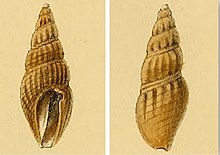Rhodopetoma erosa
Appearance
(Redirected from Bela erosa)
| Rhodopetoma erosa | |
|---|---|

| |
| Original image of shells of Rhodopetoma erosa | |
| Scientific classification | |
| Domain: | Eukaryota |
| Kingdom: | Animalia |
| Phylum: | Mollusca |
| Class: | Gastropoda |
| Subclass: | Caenogastropoda |
| Order: | Neogastropoda |
| Superfamily: | Conoidea |
| Family: | Pseudomelatomidae |
| Genus: | Rhodopetoma |
| Species: | R. erosa
|
| Binomial name | |
| Rhodopetoma erosa (Schrenck, 1862)
| |
| Synonyms[1] | |
| |
Rhodopetoma erosa is a species of sea snail, a marine gastropod mollusk in the family Pseudomelatomidae.[1]
Rhodopetoma erosa auct. non Schrenk, 1867 is a synonym of Propebela nobilis (Möller, 1842) [2]
Description
[edit]This marine species reaches 18 mm in length, its diameter 6.6 mm.
The shell is longitudinally ribbed and spirally striated. There is a narrow band at the suture brown, with sometimes a darker band at the suture and another at the base. [3]
Distribution
[edit]This species occurs off Japan and Korea.
References
[edit]- ^ a b Rhodopetoma erosa (Schrenck, 1862). Retrieved through: World Register of Marine Species on 31 March 2010.
- ^ malacolog.com: Propebela nobilis
- ^ G.W. Tryon (1884) Manual of Conchology, structural and systematic, with illustrations of the species, vol. VI; Philadelphia, Academy of Natural Sciences
 This article incorporates text from this source, which is in the public domain.
This article incorporates text from this source, which is in the public domain.
- Kantor Yu.I. & Sysoev A.V. (2006) Marine and brackish water Gastropoda of Russia and adjacent countries: an illustrated catalogue. Moscow: KMK Scientific Press. 372 pp. + 140 pls.
External links
[edit]- "Rhodopetoma erosa". Gastropods.com. Retrieved 23 January 2019.
- Schrenck, L.I. (1867) Mollusken des Amur-Landes und des Nordjapanischen Meeres. Reisen und Forschung im Amur-Landes in den Jahren 1854–1856
- Tucker, J.K. (2004). "Catalog of recent and fossil turrids (Mollusca: Gastropoda)" (PDF). Zootaxa. 682: 1–1295. doi:10.11646/zootaxa.682.1.1.
- HABE, Tadashige (1958), The Fauna of Akkeshi Bay : XXV. Gastropoda (With Plates I-V); Publications from the Akkeshi Marine Biological Station, 8: 2-39
